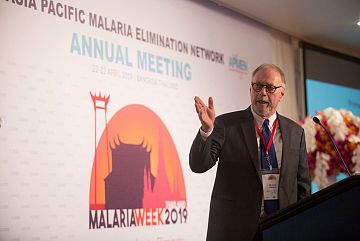APMEN and Malaria Consortium renew partnership to drive Vector Control Working Group in Asia-Pacific
26 January 2021
The Asia Pacific Malaria Elimination Network (APMEN) recently announced Malaria Consortium’s re-appointment as the host organisation for its Vector Control Working Group (VCWG), a key contributor towards achieving malaria elimination in the region.
APMEN is an alliance of 21 member states in Asia-Pacific with the goal of achieving malaria elimination by 2030. It works in close partnership with the Asia Pacific Leaders Malaria Alliance (APLMA), to enhance and streamline the Asia Pacific’s regional response to malaria. Much of the practical implementation of APMEN’s activities take place through its three working groups; the Vector Control Working Group (VCWG), the Surveillance & Response Working Group (SRWG) and, the Vivax Working Group (VxWG).
Recognising Malaria Consortium’s capacity and expertise in Vector Control, APMEN first appointed Malaria Consortium as the host organisation for its Vector Control Working Group (VCWG) in 2017. They have now renewed this stewardship role for a further two years and Malaria Consortium will provide continued technical leadership and programmatic coordination to help advance progress towards malaria elimination in the region.
Jeff Smith, Chief Operating Officer of APLMA spoke to the value Malaria Consortium brings to the position, “Most importantly, Malaria Consortium brings significant expertise to the VCWG. Since taking lead of the group, there has been increased activity in the form of information exchange and trainings […and] significant engagement with malaria programmes in the region. The APMEN VCWG has been a vehicle for sharing best practices and identifying challenges.”
Originally established in 2009, the VCWG has been an active and productive platform to provide vector control capacity-building opportunities, in particular to the National Malaria Control Programmes (NMCPs) of member states, as well as partner institutions such as universities and research organisations. Activities have included regular webinars to disseminate up to date information and experience, learning opportunities via its website (www.orene.org – the Online Resource Exchange Network for Entomologists) and an annual conference for vector control practitioners in Asia-Pacific to convene discussion on current challenges in the region. In addition, the VCWG has also supported national representatives from member state NMCPs, universities and research institutions to participate in specialist courses and facilitated research on appropriate vector control aspects.
Last year, following the outbreak of COVID-19, the VCWG revised its planned activities, including running the flagship annual intensive two-week Malaria Vector Surveillance for Elimination training course. Instead, a series of well attended webinars was held covering a range of vector control topics, with specialist trainers from across the world.
Dr Leo Braack, Senior Vector Control Specialist, Malaria Consortium and Technical Lead for the APMEN VCWG explains that despite the continued presence of COVID-19 affecting plans, the VCWG are planning to develop online training courses and focusing on improving the ORENE website to make it a much expanded and improved learning platform. Speaking of the reappointment he said, “We are honoured and encouraged by this gesture of confidence and excited for the opportunity to continue to strengthen our excellent partnership with APMEN, NMCPs and other partners. We are ready to renew our efforts with a substantial workplan for 2021 to opitimise our contribution towards securing malaria elimination together.”
Latest news
- Malaria Consortium honoured by Ugandan government for contribution to combat malaria23rd April 2024
- International summit calls for AMR accountability in public health interventions21st March 2024
- Global SMC community celebrates new milestone at SMC Alliance Annual Meeting in Nigeria6th March 2024
- Scaling up key interventions could halve pneumonia-related childhood mortality13th February 2024
- Malaria Consortium and eGov Foundation join Mozambique’s national malaria programme to digitalise seasonal malaria chemoprevention campaigns8th February 2024
- World’s first malaria vaccine rollout launched in Cameroon22nd January 2024